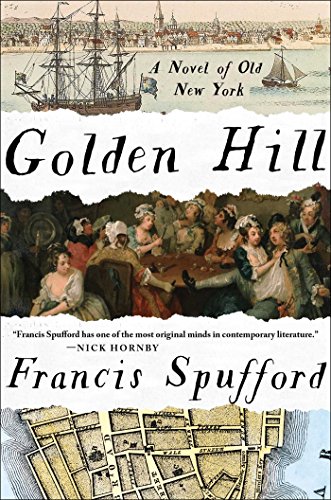Golden Hill
In November of 1746, young Mr. Smith, fresh from London, hops off a ship in New York and hightails it to Lovell & Company on Golden Hill Street, where he presents an outrageous request – a bill saying he’s owed a thousand pounds. What could he want with such an enormous sum? What does he propose to do with it in the small town – waste it, go into trade, destabilize the government? Merchant Lovell and his coterie, including his shrewish daughter, the governor, the Assembly, and more, wait for the next ships to arrive to see if Smith is what he appears to be, or the worst kind of fraudster – a slightly eccentric businessman, or someone to be dangled from a gibbet. Meanwhile, Smith seems quite content to let speculation run amok.
Spufford’s novel seems far too accomplished to be a first try, yet this is his initial foray into fiction after several nonfiction works. The book is more crafted than written, its style and allusions heavy with Fielding and Smollett. Smith is a gem of a character, and the smattering of humanity he encounters in colonial America is also drawn with color and depth. The setting and cultural ambiance are immersive. Much is made of the comparison between filthy, teeming London and the clean provinciality of New York, which in and of itself is satirically amusing when viewed through modern eyes. The research is everywhere yet completely unobtrusive – everything from the vagaries of colonial monetary systems to the game of piquet, presented in a literary style that is best described as eminently readable 18th-century pastiche. Personally, I found the “reveal” in the end to be a tad bit anti-climactic, but the events leading up to it and the entire flavor, tone, and prose of the book make this an exceptional read whose pages practically flew by.










